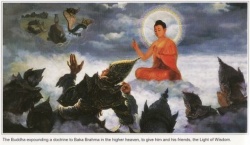Princess Yasodharā: An Icon of Unconditional Love
Had a hearty lunch and a nice session of Dharma exchange on Monday. During the conversation, someone mentioned Buddhist Studies during Secondary School days and memories flooded into my mind. I still remember my indecisiveness over which to religious studies to choose. All I wanted was an easy subject to pass and not another academic burden to bear. Opinions I gathered from my seniors varied. Though I was fascinated by Confusion’s aphorisms, I was not going to drive myself crazy over difficult ancient Chinese text. Christianity was rather foreign to me then.
I was a born again Buddhist and was labeled as one before I even knew what Buddhism was really about. Other than Hindu and Islamic Studies, Buddhism became the only option. Plus, rumor had it that it’s the easiest to pass, while offering many fascinating stories. I can’t recall much of what I learnt of Buddhism during the classes. I would hesitate to blame it all on the teacher, but seriously, if she had made the class a little bit more intriguing, I would probably be more enthusiastic in learning.
Things I remember… Stories of Prince Siddhartha till he gained Enlightenment… and Princess Yasodharā; not the Four Noble Truths or the Noble Eightfold Path! Why Yasodharā? I wondered if it’s because our names have the common syllable – Ya! If that’s the case, it’s pretty lame. Anyway, Yasodharā was one of the characters I admired the most in Buddha’s life. She is the perfect Buddhist wife. As a matter of fact, as a wife in general too. A man who could marry a wife like her would require great merits like Siddhartha (who became the Buddha). Likewise, someone who deserves Siddhartha as a husband definitely has great virtues.
Yasodharā (who later became the Arahant Bhaddha Kachchyana) married Siddhartha at the age of 16. For 13 years, she lived in utmost luxury and bore a son at the age of 29. On the day Rahula was born, Siddhartha decided to renounce his worldly life to seek the solution to transcend the cycle of life and death. For this greater cause for benefiting all beings, he left Yasodharā and Rahula in the palace. Sad she was but without complaint, she was supportive of her husband’s noble vision. When she heard that he was wearing yellow robes, she too robed herself in yellow. So did she follow suit by taking one meal a day, lying on a low couch, giving up garlands and scents… It made me wonder how many of us could be like her if our spouses depart.
In the modern context, Yashodhara might be seen as old-fashioned, whose response would be unthinkable in our times. But it’s only unthinkable to us when the sense of self or ego is strong in us. We might still slant towards self-advantage no matter how giving we are towards our partners, unable to escape the fact that we need our partners for some subtle hidden agendas – that we might not even be aware of. If we are to reduce that sense of self, what disadvantages would one experience? None! The giving would be pure giving, the love true love – that is joyous and unrestrained. That, I would think, Yashodhara was able to do – a feat that is really timelessly cool!
When war broke out between the Sakyans and Koliyans, Yasodharā gave up her royal status and followed Queen Pajapati Gotama to be ordained as nun in the order of the Sangha. Soon after, she attained arahantship. After seeking the Buddha’s permission to leave (pass away) at the age of 78, Yasodharā entered into Parinibbana with loving-kindness and composure, with no tears or sorrow.
I remember reading about Yasodharā and the Buddha’s past lives as spiritual partners. Such unconditional understanding and devotion must be that of great Bodhisattvas. It was not only in the last life that Yasodharā had been devoted to the Buddha, but for 500 lifetimes, in which they supported each other spiritually. This, is one true epic love story that spans eras! And who says love lasts only till death does two apart?!!
It’s obvious that the love between the Buddha and Princess Yasodharā was no ordinary mundane love. It’s a love that encompasses all virtues, that gears the couple towards spiritual attainments. May any love not be fuelled by greed, hatred and delusion. May no couple be steered off course to dwell in the misery of cyclic rebirth. May we always be filled with loving-kindness and compassion towards one another. May we aid all to gain enlightenment.
